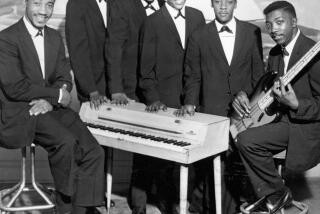JAZZ REVIEWS : Lessons From a Masterful Performer
- Share via
Is any male jazz singer, anywhere, sounding better than Joe Williams these days?
Even a debilitating bout with pneumonia hasn’t diminished the unsurpassed quality of his voice or the charm of his performances.
Saturday night at Pepperdine University’s Smothers Auditorium, in only his second engagement after his February illness, the 76-year-old artist gave an object lesson in how to blend jazz authenticity with crowd-pleasing entertainment. It was the kind of appearance that should have been preserved for presentation at every singing school in the country.
Williams has always been justifiably admired as a blues singer and he devoted a substantial portion of his too-brief program to familiar favorites.
But ever in search of new perspectives, he sang his signature “Every Day I Have the Blues” over a rhythm pattern derived from Miles Davis’ “All Blues,” and followed with a sing-along version of “I’d Rather Drink Muddy Water” (with the sight and sound of the overflowing, happily enthusiastic Pepperdine audience singing I’d rather drink muddy water . . . something to behold).
It has been a very long time, however, since “blues singer” accurately described the full spectrum of Williams’ talent. The sheer swing and drive he applied to “Please Don’t Talk About Me When I’m Gone,” the combination of reverence and exhilaration in his rendering of the spiritual “Walk With Me” (from his current album on Telarc) were the working tools of an artist with the capacity to bring the spirit and soul of jazz to everything he touches. And the multileveled layers of experience, feeling and musical subtlety in Williams’ touching interpretation of “Here’s to Life” represented a depth of ballad singing rivaled only by Billie Holiday’s finest work.
Williams was accompanied by a quartet--Norman Simmons on piano, Henry Johnson on guitar, Scott Steed on bass and Colin Bailey on drums--that was a singer’s dream.
Simmons, in particular, seemed responsive to Williams’ every need, harmonically supportive on ballads, bustling with riff-driven rhythms on the up-tempos, and coolly articulate in his own bop-drenched solo passages. Johnson filled in the gaps, and Steed and Bailey laid down the energetic flow essential to Williams’ music.
More to Read
The biggest entertainment stories
Get our big stories about Hollywood, film, television, music, arts, culture and more right in your inbox as soon as they publish.
You may occasionally receive promotional content from the Los Angeles Times.










